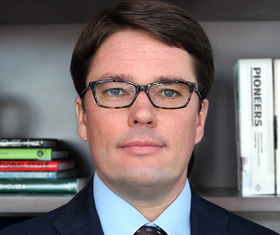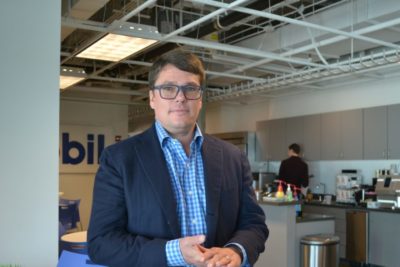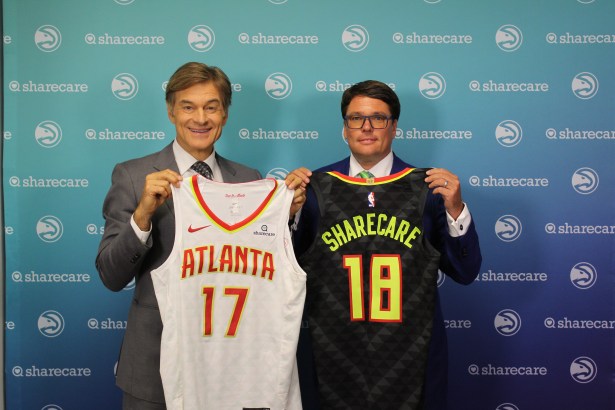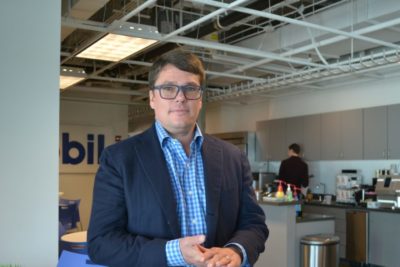Jeff Arnold remembers well the day he was sitting at a table at the White House restaurant in Atlanta’s Buckhead district, wearily sipping a cup of coffee. As on almost every day over the previous four years, he had just sent out several hundred faxes filled with EKG data.
The Internet was just beginning to be a force in the business world. “I thought, ‘We need to put this information where the doctors can see it the same time we do,’ ” recalls Arnold, who was then owner of a small heart-monitoring company.

And not just the EKG data. “I was wondering how to put all of a person’s medical information in just one place.”
His idea: “Health needs a homepage.” He sold his heart-monitoring business and founded WebMD, which would become the leading health information website worldwide. He launched it in the summer of 1998, when he was 28 years old.
Fast-forward 20 years. Arnold has long since sold WebMD and is now running Atlanta-based Sharecare Inc., a digital health and wellness engagement platform where all health information can come together — what he envisions as more interactive, more personalized, more powerful than WebMD.
“If LinkedIn is your business profile and Facebook is your social profile, Sharecare wants to be your health profile,” says Arnold, a co-founder who serves as the company’s CEO.
For his venture, he partnered with television personality Dr. Mehmet Oz and got powerful backing by Harpo Studios, Oprah Winfrey’s production company, as well as Sony Pictures and the Discovery Channel.
Organizations such as AARP, the American Cancer Society, the American Heart Association and the American Red Cross, as well as high-level health care institutions like the Cleveland Clinic and Johns Hopkins University, agreed to contribute experts and content.
Technology experts have plenty of praise for Arnold’s venture. “Jeff Arnold has been instrumental in shaping Georgia’s technology community,” said John Nee, partner at Pricewaterhouse Coopers, the global accounting and consulting firm, in 2013, when Arnold was inducted into Georgia’s Technology Hall of Fame. He added that through WebMD and Sharecare, Arnold “helped millions of people find targeted content on the Internet.”
Tino Mantella, then president of the Technology Association of Georgia (TAG), pointed out that Arnold was an “example of the innovative and enterprising spirit that has made Georgia a leading technology center.”
Using science to improve people’s lives
Arnold leans back in a chair at the conference table in his airy seventh-floor Buckhead office. A large screen on the wall behind him shows population health and wellness data from Sharecare users pouring in at real time. At 48, the serial entrepreneur still looks like a grad student ready to join the workforce, wearing dark-rimmed glasses and a fashionable checkered shirt under a blue suit.

“Health care in the United States is so fragmented,” Arnold says. “How, as a patient, am I supposed to manage my insurance information, my medical records, my medical literacy, my prescription drugs? It’s all over the place.”
Health care, he adds, should be like banking, which has become consumer-friendly due to digital technology. “Or, look at self-driving cars,” he says, an invention that could completely change the way people are going to use transportation in the future.
“This will be a reality before we fix health care,” he says. “And that’s unfortunate.”

Arnold got involved with health care partly by happenstance. The Atlanta native and former University of Georgia student (he left before graduating) first started as a pharmaceutical sales rep when he was in his early 20s. The opportunity presented itself, the money was good, and he wasn’t sure what to do after college anyway.
A few years later, he came across the idea for his heart-monitoring business during a casual conversation as he was waiting to pick up his girlfriend, now his wife, from a night shift at Emory, where she was studying to become a nurse.
Arnold says he’s never really been a techie, not as a kid and not now.
“I love technology and obviously, I invest a lot of money in it,” he says. But technology, he continues, should be a tool “to solve problems, to make things simpler, more cost-effective, to make people happier and more productive.”
That’s why he founded Quality Diagnostic Services, his heart-monitoring business, and then WebMD. After WebMD merged with Silicon Valley startup Healtheon in 1999 and the dotcom market crashed in 2000, he decided to resign as CEO and move on. By the time he left, the company was worth $1 billion.
For the next few years, he took a hiatus from health care and explored the entertainment industry. He patented putting tiny CDs into the lids of soft drinks. That was before iTunes changed the way music was distributed.

In 2002, Arnold bought HowStuffWorks, back then a small, geeky educational website, and turned it into a global franchise. He sold HowStuf Works to Discovery Communications in 2007. His involvement with Discovery led him to reconnect with digital health, and eventually to the founding of Sharecare in 2010.
Life and wellness data — in your hand
Today, Sharecare has about 2,600 employees. The company is headquartered in Atlanta, with offices in New York, California, Florida, Vermont and Berlin.
Through 11 strategic acquisitions, Sharecare has been able to offer a wide array of health IT services under its umbrella.

Services range from determining a person’s overall health and fitness status based on lifestyle, diet and medical data, an index called the “RealAge,” to tracking sleep and stress. Sharecare users can also research provider networks; manage prescriptions and doctor’s appointments; compare prices of drugs, services and procedures; and ask health-related questions. To date, about 68 million people have engaged the Sharecare platform, according to the company’s website.
Now, almost all of Sharecare’s services are being combined into one smartphone app.
“I don’t like point solutions,” says Arnold. “I don’t have 12 different apps to manage my money, and I don’t want 12 different apps to manage my health.”
A partnership with opinion pollster Gallup has further increased Sharecare’s public visibility. The Sharecare-Gallup Well-Being Index is published on a regular basis and continually measures the nation’s collective state of health and happiness.
“It’s a good benchmarking tool,” says Arnold. “We can run population data against personalized data and by doing so, determine the effectiveness of Sharecare.”
Arnold thinks there’s currently a momentum that works in favor of Sharecare’s business model. With more high-deductible health plans on the market, people are in need of information, education and guidance. “Consumers become critical buyers of health care,” he says.
At the same time, established health systems and insurers have invested a lot of money in their own websites and apps, without getting the desired results.
“So they may be more open to see that the consumer needs an unbiased vessel for their data,” says Arnold.
His optimism could be proved right. Last year, investors in the United States alone poured more than $4.7 billion into digital health companies, according to Rock Health, a San Francisco-based venture capital fund. Tech giants like Google, Apple, Oracle, and Microsoft have all launched projects related to health care.
“In 2018, one thing will remain constant,” predicts Fortune.com in a commentary. “The digital health field will continue to grow.”
Corporate involvement questioned
Not everyone is convinced that a company like Sharecare will be cashing in big on the trend. Health IT is a crowded field these days, where insurers, employers, doctors and health systems all try to engage patients via online platforms.
“Conceptually, having a single place where patients can get and manage all their health information is a great idea,” says David Howard, health economist at Emory University’s Rollins School of Public Health. But he says he suspects that “without the ability to automatically pull information from patients’ electronic medical records, any platform like this will have limited success – and plateau at some point.”

Howard adds that while patients could theoretically give consent to have their information released to the platform, “in reality, that may be a lot of work and a lot of red tape to sort through.” Due to HIPAA requirements, even providers need patients’ consent to share health data with one another.
When Sharecare first launched in 2010, criticism also sprang up about the way the platform gives marketers a say in the content. Sponsors get to respond to questions by users on the site. An example cited by the New York Times and other media reports is drug maker Pfizer, which could be answering questions about how to quit smoking without directly mentioning its own smoking-cessation drug, Chantix.
Arnold defends using such information. “Industry spends a ton of money on R&D,” he says, “and they have a lot of knowledge to dispense.”
It’s knowledge that Sharecare wants to tap into. That’s why the company decided “to give industry a voice,” the CEO explains. “But we’re clearly labeling it.”
Reminders that can save lives
A recent addition, and one of the most popular features on the Sharecare platform, is an app that measures and analyzes a person’s stress level by studying the fractal pattern of his or her voice while talking on the smartphone.

“A fractal pattern is an emotional thumbprint that your voice puts out,” Arnold explains. “It’s like an emotional selfie.”
The app generates a result after each phone call: Green means low levels of stress, while red means it’s high. The technology behind the voice app was developed by Feingold, a German software firm that Sharecare acquired in 2015.
With services like the voice stress tracker, as well as other solutions like the “real age” index, Arnold says Sharecare tries to motivate people to think about their health every day — and not just when they are sick.
“We want to bring the idea from episodic to everyday,” he says, “and what better tool to use for that than the smartphone?”
Through all of his ventures, with their national and international scope, Jeff Arnold has stayed in Atlanta. He and his wife, Meg, have four children, two girls and two boys, between 19 and 11.
Arnold says that with top-notch research institutions like Georgia Tech and Emory, as well as the CDC and an overall business friendly climate, his hometown is an attractive market for digital health companies.
But there’s something else to it, something about the culture of the region.
“I think that health care and Southern hospitality fit hand in glove,” Arnold says. He believes that one of the reasons why many health care inventions born in Silicon Valley never really took off was the lack of a personal, human rapport.
Arnold is convinced that the ability to build relationships, directly or indirectly — with patients, providers, and all the different partners — is key to success in his field.
It’s not just about the code, numbers and algorithms, he says. “With health care, it’s got to be both, high-tech and high-touch.”
Katja Ridderbusch is an Atlanta-based independent journalist who contributes to German and American newspapers, magazines and public radio stations. She frequently reports about health care in the United States.

